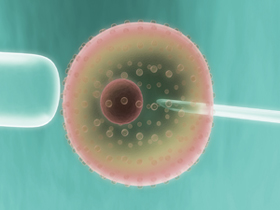Delivering stem cells by post means more effective global treatment
Release Date 11 December 2012

Findings from a new University of Reading study could lead to cheaper¹, wider and more effective stem cell research and treatment of disease.
The researchers found that stem cells², which are typically frozen using dry ice or liquid nitrogen, could be stored using a semi-permeable hydrogel at room temperature. Not only was the method cheaper than current cryogenic processes, it even meant that stem cells could be sent between labs in the post. Crucially, it also allows the cells to be used immediately on arrival.
Stem cells and cell-based therapy hold enormous potential for the future treatment of illnesses, from cancer to heart disease. However a number of challenges must be met before this promising approach can become a reality. One such hurdle is how to store and transport the cells from the manufacturer to the patient, as current cryogenic solutions are technically challenging and expensive.
"Dr Che Connon, from the University's Department of Pharmacy, led the Biotechnology & Biological Sciences Research Council (BBSRC) and Engineering and Physical Sciences Research Council (EPSRC) funded study, in collaboration with the Bioprocessing Research Industry Club (BRIC)."
He said: "Cryogenic shipment of cells represents a significant challenge for companies working in the area of cell therapy and regenerative medicine. However we found that stem cells stored in hydrogels maintained a survival rate of 80% which compared favourably to current transport solutions. Importantly this method also allows the cells to be delivered by standard post (via secure delivery), significantly reducing transport costs which currently run far in excess of cell manufacture.
"Our discovery will allow scientists and surgeons across the globe to have immediate access to therapeutic-quality stem cells but without the costly infrastructure needed by specialist hospitals. Hydrogels provide a simple and effective means of supplying stem cells. This opens up the potential use of cell-based treatments to local or poor communities world-wide."
Cryogenic storage and delivery also adjusts the state of stem cells. Transportation by hydrogel solves this problem.
"Once released from hydrogel storage the cells were found to be unaltered unlike those released following cryopreservation," added Dr Connon. "This means the cells did not require any further costly optimisation or acclimatisation before use."
Dr Connon has just been awarded a grant totalling £735k by the BBSRC and EPSRC which will enable him to work in collaboration with the bioprocessing community (BRIC), and scale up the hydrogel encapsulation approach to industrially relevant levels."
ENDS
For all media enquiries please contact James Barr, University of Reading Press Officer on 0118 378 7115 or by email on j.w.barr@reading.ac.uk
Follow us on Twitter | Like us on Facebook | Read our research blog 'The Forum'
Notes for Editors
¹ at a lab/research scale, a single hydrogel will cost less than 1p (plus post and packaging), whereas shipment on dry ice costs about £50
²Human mesenchymal stem cell (hMSC) and mouse embryonic stem cells (mESC)
Novel alternative to cryo-preservation for the short- term storage of stem cells for use in cell therapy using alginate encapsulation was published in the journal Tissue Engineering
The University of Reading is ranked among the top 1% of universities in the world (THE World University Rankings 2012) and is one of the UK's top research-intensive universities. The University is ranked in the top 20 for the number of awards it received from research councils for 2010/11.